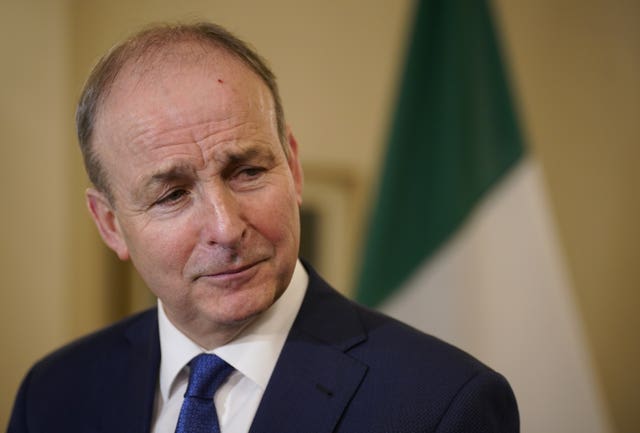
Never again should one party in Northern Ireland have the power to collapse the powersharing institutions, Ireland’s deputy premier has said.
Tanaiste Micheal Martin said he would like to see reform of the institutions to remove the veto mechanism ahead of the next Assembly election.
Mr Martin spoke of his desire to see changes to the Stormont system as he addressed the Dail on Wednesday.
On Thursday he elaborated on that position and his preferred timeline for reform.
Speaking to reporters in Dublin, Mr Martin acknowledged any changes could only be secured through inclusive talks involving the UK and Irish governments and all the main Stormont parties.

In response, Sinn Fein First Minister Michelle O’Neill said her party was prepared to examine potential reforms as part of the work programme of Stormont’s Assembly and Executive Review Committee.
DUP deputy First Minister Emma Little-Pengelly said the best way to ensure stability of the institutions in Northern Ireland was by fostering strong working relationships between the parties within the administration.
The Stormont institutions incorporate a system based on mutual veto powers, enabling blocs of unionist and nationalist MLAs to stop moves that otherwise command majority support and, in extreme circumstances, pull down the institutions and prevent them operating.

The DUP exercised its veto to blockade Stormont for two years in protest at post-Brexit trading arrangements.
The ending of that boycott enabled devolution to return earlier this month.
In 2017, Sinn Fein collapsed the ministerial executive amid a furore about a botched green energy scheme.
The UK and Irish government have faced calls from rivals of the two biggest parties, including the cross-community Alliance Party, to change the rules to prevent future collapses of devolution.
Mr Martin said political leaders should take the opportunity between now and the next Assembly election to discuss potential reforms of the Good Friday Agreement structures.
“Obviously such talks will have to involve the two governments, the British and Irish governments, and all of the parties in Northern Ireland, but as a fundamental principle in the aftermath of a general election, a parliament should be formed or an assembly should be formed,” he said.
“And one of the objectives of the reforms that I am articulating, along with others, is that never again should we have a situation where in the aftermath of an election in Northern Ireland that an assembly does not get convened and that no one party, irrespective of background, because different parties have pulled down the executive at different times and pulled down the assembly, never again should one party have that power to prevent an assembly being established after an election.
“To me it’s a very basic tenet of democracy, when people vote, they vote their representatives to go into an assembly or into a parliament, it should naturally follow, as day follows night, that that assembly is convened.”
Ms O’Neill and Ms Little-Pengelly were asked about Mr Martin’s call for reform after they headed up a meeting of the powersharing executive in Belfast on Thursday.
“Now that we’ve got the executive up and running, all of our energy and effort needs to be on making it work and ensure that it never does collapse again,” said Ms O’Neill.
“We’re here because we want to do business.
“So I’ve always had the view in terms of reform that in the first instance we needed to get the executive up and running and (from) two years ago the Assembly election result respected.
“But now there’s a forum for us to have a conversation around how we can make things work better and that’s the Assembly and Executive Review Committee.
“That’s been established for us to look at this whole gamut of reform. Our reps will be there and we will engage in all of that.”
Ms Little-Pengelly said her aim was to ensure that the circumstances that could create instability do not arise again.
“And I think the best way to avoid that is by establishing strong, robust and constructive working relationships,” she said.
“That’s what I am determined to do.
“I feel that that is also the determination that is shared by Michelle and other members around that executive table.
“Look, we’re determined to make this work.
“We’re also determined to deliver for people.
“Our public services require a huge amount of effort and attention in terms of improvement and delivering for people.
“That is what I will be focusing on and working very constructively with others in order to make that happen.”
During the last governance impasse in Northern Ireland, UK Prime Minister Rishi Sunak said he understood the frustrations of those calling for reforms, but he said changes could only be considered once devolution was back up and running.

Enjoy the convenience of having The Sunday Post delivered as a digital ePaper straight to your smartphone, tablet or computer.
Subscribe for only £5.49 a month and enjoy all the benefits of the printed paper as a digital replica.
Subscribe